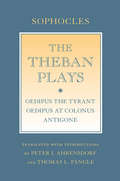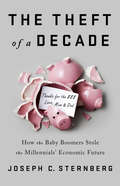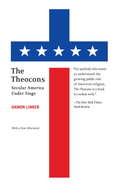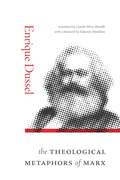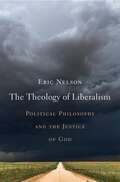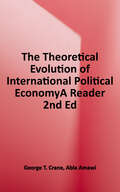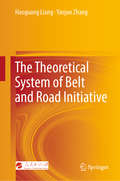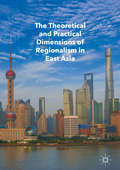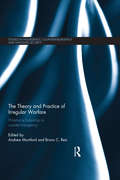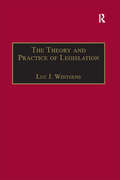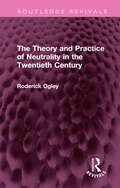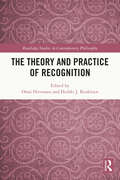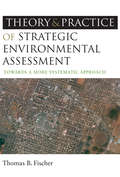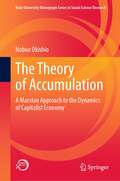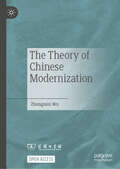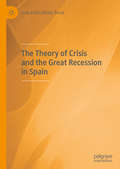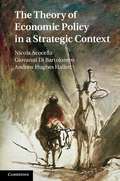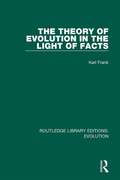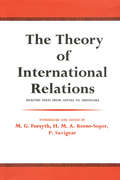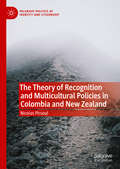- Table View
- List View
The Theban Plays: "Oedipus the Tyrant"; "Oedipus at Colonus"; "Antigone"
by Sophocles Peter J. Ahrensdorf Thomas L. PangleThe timeless Theban tragedies of Sophocles--Oedipus the Tyrant, Oedipus at Colonus, and Antigone--have fascinated and moved audiences and readers across the ages with their haunting plots and their unforgettable heroes and heroines. Now, following the best texts faithfully, and translating the key moral, religious, and political terminology of the plays accurately and consistently, Peter J. Ahrensdorf and Thomas L. Pangle allow contemporary readers to study the most literally exact reproductions of precisely what Sophocles wrote, rendered in readily comprehensible English.These translations enable readers to engage the Theban plays of Sophocles in their full, authentic complexity, and to study with precision the plays' profound and enduring human questions. In the preface, notes to the plays, and introductions, Ahrensdorf and Pangle supply critical historical, mythic, and linguistic background information, and highlight the moral, religious, political, philosophic, and psychological questions at the heart of each of the plays. Even readers unfamiliar with Greek drama will find what they need to experience, reflect on, and enjoy these towering works of classical literature.
The Theft of America’s Soul: Blowing the Lid Off the Lies That Are Destroying Our Country
by Phil RobertsonIt’s time to take back what the devil has stolen and put God back into our culture.Phil Robertson, patriarch of A&E’s Duck Dynasty and one of the most recognized voices of conservative Christianity in America, believes that little by little, generation by generation, America has allowed the lines of morality, decency, and virtue to be erased. Our values have disappeared as we began to believe lies—such as that God is dead, truth is relative, and unity is impossible—that have brought discord, division and protest. But Phil also believes that things can change.Writing with captivating storytelling and unflinching honesty, Phil shows how to make America a God-honoring nation once more: by dropping the ten central lies that rule our day and taking up the ten truths that will bring peace of mind, harmony, and prosperity back to our country. The Theft of America’s Soul is a prophetic wake-up call for all who desire to see our nation thrive. And it is also an invitation to experience the life-giving, peace-filling, wholly-transforming love of God.
The Theft of a Decade: How the Baby Boomers Stole the Millennials' Economic Future
by Joseph C. SternbergA Wall Street Journal columnist delivers a brilliant narrative of the mugging of the millennial generation-- how the Baby Boomers have stolen the millennials' future in order to ensure themselves a comfortable presentThe Theft of a Decade is a contrarian, revelatory analysis of how one generation pulled the rug out from under another, and the myriad consequences that has set in store for all of us. The millennial generation was the unfortunate victim of several generations of economic theories that made life harder for them than it was for their grandparents. Then came the crash of 2008, and the Boomer generation's reaction to it was brutal: politicians and policy makers made deliberate decisions that favored the interests of the Boomer generation over their heirs, the most egregious being over the use of monetary policy, fiscal policy and regulation. For the first time in recent history, policy makers gave up on investing for the future and instead mortgaged that future to pay for the ugly economic sins of the present. This book describes a new economic crisis, a sinister tectonic shift that is stealing a generation's future.
The Theme Is Freedom: Religion, Politics, and the American Tradition
by M. Stanton EvansIn The Theme Is Freedom, readers will be challenged on nearly every concept they've learned in history classes from elementary school to college: that our liberties stem from secular doctrines; that religious absolutes endanger freedom; and that the Bill of Rights created a "wall of separation" between religion and our public institutions.
The Theocons
by Damon LinkerGeorge W. Bush has gone out of his way to blur the line between religion and politics in America—this is acknowledged by his strongest supporters no less than by his most strident critics. The most common explanation of the president’s religious agenda points to rise of evangelical Protestantism. Yet as Damon Linker demonstrates in his groundbreakingbook, an exclusive focus on the role of evangelicals misses the heart of the story. At its core, the Bush administration’s overt religiosity represents the triumph of an ideological movement that for the past several decades has devoted itself to fashioning a theocratic governing philosophy for the United States—a governing philosophy rooted in Roman Catholicism. Led by Father Richard John Neuhaus, this group of “theoconservatives” has actively sought to roll back the division of church and state in American life. The election of 2000 brought the theocons to the peak of political power and influence in Washington. Their ideas inspire the most controversial and divisive policies of the Bush administration—policies whose ultimate goal is nothing less than the end of secular politics in America.
The Theological Metaphors of Marx
by Enrique DusselIn The Theological Metaphors of Marx, Enrique Dussel provides a groundbreaking combination of Marxology, theology, and ethical theory. Dussel shows that Marx unveils the theology of capitalism in his critique of commodity fetishization. Capitalism constitutes an idolatry of the commodity that undergirds the capitalist expropriation of labor. Dussel examines Marx’s early writings on religion and fetishism and proceeds through what Dussel refers to as the four major drafts of Capital, ultimately situating Marx’s philosophical, economic, ethical, and historical insights in relation to the theological problems of his time. Dussel notes a shift in Marx’s underlying theological schema from a political critique of the state to an economic critique of the commodity fetish as the Devil, or anti-God, of modernity. Marx’s thought, impact, and influence cannot be fully understood without Dussel’s historic reinterpretation of the theological origins and implications of Marx’s critiques of political economy and politics.
The Theology of Liberalism: Political Philosophy and the Justice of God
by Eric NelsonModern liberal political philosophy is closely associated with post-1945 secularism. But Eric Nelson contends that the liberal tradition founded by John Rawls is an unwitting outgrowth of ancient theological debates about justice and evil. When we understand this, we can better untangle the knotted strands of liberal political thought.
The Theoretical Evolution of International Political Economy: A Reader
by George T. Crane Abla AmawiThis collection of seminal readings in international political economy charts the historical and theoretical evolution of the field from the eighteenth century to the present day. Bringing together classic works and leading contemporary arguments, this book outlines the development of three schools of IPE thought—Liberalism, Marxism, and Realism—and also includes recent syntheses of these approaches to show how conventional theoretical categories are giving way to more eclectic conceptual schemes. <p><p>The second edition features an added section on the postmodern turn in the study of international political economy, and includes a number of new readings. The readings include works by Alexander Hamilton, Friedrich List, David Ricardo, Adam Smith, Lenin, Karl Marx, Friedrich Engels, Richard Cooper, Robert O. Keohane, Joseph S. Nye, Christopher Chase-Dunn, Robert Cox, Robert Gilpin, Mancur Olson, Richard Zeckhauser, Bruno S. Frey, Immanuel Wallerstein, Susan Strange, Donald J. Puchala, Raymond F. Hopkins, Alice A. Amsden, Peter M. Haas, David Harvey, and Michael J. Shapiro. <p><p>Providing many of the most frequently cited IPE references in a single volume, the second edition of The Theoretical Evolution of International Political Economy will no doubt be a valuable resource for students of international relations and international economics.
The Theoretical System of Belt and Road Initiative
by Yaojun Zhang Haoguang LiangThis book, combining history and reality, theory and practice, is devoted to establishing a theoretical system on the Belt and Road Initiative by analyzing 24 related major questions , such as a community with a shared future for mankind, Green Silk Road, Digital Belt and Road, the Arctic Channel, Geographic Space, financial innovation, energy cooperation, language planning and discourse power of think tanks. This book proposes relevant theoretical frameworks and suggestions to provide intellectual support for the development of the Belt and Road Initiative.
The Theoretical and Practical Dimensions of Regionalism in East Asia
by Karolina Klecha-TylecThis book provides a comprehensive overview of developments in East Asian regionalism, combining qualitative evidence with empirical quantitative analysis. It argues that two dominant processes have formed East Asian regionalism: 1) regionalization, and 2) inter-regionalism. Klecha-Tylec examines the differences between traditional and new regionalisms as they apply to East Asia; the differences between East Asian and European regionalism; the role of the United States in shaping regional links; and the evolution of the three key structures of ASEAN, ASEAN+3, and Asia Summits. The book is unique for examining together the network, zonal, and geospatial dimensions of relations in East Asia as they apply at micro-regional, sub-regional, macro-regional, trans-regional and inter-regional levels. The book offers a detailed analysis of intra-regional links and the hybrid relationships between micro-regions and nation-states.
The Theory and Practice of Irregular Warfare: Warrior-scholarship in counter-insurgency (Studies in Insurgency, Counterinsurgency and National Security)
by Andrew Mumford and Bruno C. ReisThis book offers an analysis of key individuals who have contributed to both the theory and the practice of counterinsurgency (COIN). Insurgencies have become the dominant form of armed conflict around the world today. The perceptible degeneration of the occupations of Iraq and Afghanistan into insurgent quagmires has sparked a renewal of academic and military interest in the theory and practice of counterinsurgency. In light of this, this book provides a rigorous analysis of those individuals who have contributed to both the theory and practice of counterinsurgency: ‘warrior-scholars’. These are soldiers who have bridged the academic-military divide by influencing doctrinal and intellectual debates about irregular warfare. Irregular warfare is notoriously difficult for the military, and scholarly understanding about this type of warfare is also problematic; especially given the residual anti-intellectualism within Western militaries. Thus, The Theory and Practice of Irregular Warfare is dedicated to analysing the best perceivable bridge between these two worlds. The authors explore the theoretical and practical contributions made by a selection of warrior-scholars of different nationalities, from periods ranging from the French colonial wars of the mid-twentieth century to the Israeli experiences in the Middle East; from contributions to American counter-insurgency made during the Iraq War, to the thinkers who shaped the US war in Vietnam. This book will be of much interest to students of counterinsurgency, strategic studies, defence studies, war studies and security studies in general.
The Theory and Practice of Legislation: Essays in Legisprudence (Applied Legal Philosophy)
by Luc J. WintgensThis work provides a rational framework for legislation. The unifying premise behind the essays is that, although legislation and regulation are the result of a political process, legislation and regulation can be the object of theoretical study. The volume focuses on problems that are common to most European legal systems and the approach involves applying to legislative problems the tools of legal theory - hence 'legisprudence'. Whereas traditional legal theory deals predominantly with the application of law by the judge, legisprudence enlarges the field of study so as to include the creation of law by the legislator. The original essays published in this collection expose and develop a range of new insights into the relationship between legislative problems and legal theory in a way which will engage and interest legal scholars throughout the world.
The Theory and Practice of Neutrality in the Twentieth Century (Routledge Revivals)
by Roderick OgleyOriginally published in 1970 The Theory and Practice of Neutrality in the Twentieth Century documents the various shapes and forms that neutrality has taken. The most important are neutralization, traditional neutrality, ad hoc neutrality and non-alignment. Each of these terms is carefully defined and illustrated by documents running from the beginning of this century to the late 1960s. This enables students to judge for themselves whether neutrality can again become, as it was in the past, an honourable convenience, or whether, except in so far as it contributes to mediation and peacekeeping, it is an anachronism.
The Theory and Practice of Recognition (Routledge Studies in Contemporary Philosophy)
by Heikki J. Koskinen Onni HirvonenThis volume presents new essays on the theory and practice of recognition. In order to retain its overall plausibility as a critical social theory, contemporary recognition theory needs to be able to successfully combine theory with real-life perspectives, in both contemporary and historical contexts. Contemporary recognition theory has developed into an established and active multidisciplinary research programme. The chapters in this volume have two main purposes. First, they engage in theoretical development of the contemporary theories of recognition. They explore the conceptual histories and the environments of recognition, as well as the connection between recognition and authenticity, emancipation, and social ontology. Second, they connect the theoretical insights of contemporary recognition with analyses of contemporary and historical social practices. These contributions explore themes such as populism and polarization, models of harmful invisibilization and social ignorance, the problem of evil and suffering, and social justice phenomena such as the #MeToo movement. The Theory and Practice of Recognition will be of interest to scholars and advanced students working in social and political philosophy, social ontology, political theory, and sociology.
The Theory and Practice of Recognition (Routledge Studies in Contemporary Philosophy)
by Heikki J. Koskinen Onni HirvonenThis volume presents new essays on the theory and practice of recognition. In order to retain its overall plausibility as a critical social theory, contemporary recognition theory needs to be able to successfully combine theory with real-life perspectives, in both contemporary and historical contexts.Contemporary recognition theory has developed into an established and active multidisciplinary research programme. The chapters in this volume have two main purposes. First, they engage in theoretical development of the contemporary theories of recognition. They explore the conceptual histories and the environments of recognition, as well as the connection between recognition and authenticity, emancipation, and social ontology. Second, they connect the theoretical insights of contemporary recognition with analyses of contemporary and historical social practices. These contributions explore themes such as populism and polarization, models of harmful invisibilization and social ignorance, the problem of evil and suffering, and social justice phenomena such as the #MeToo movement.The Theory and Practice of Recognition will be of interest to scholars and advanced students working in social and political philosophy, social ontology, political theory, and sociology.
The Theory and Practice of Strategic Environmental Assessment: Towards a More Systematic Approach
by Thomas B Fischer?Anyone serious about integrating environmental factors into planning and policy making will gain new insights and ideas from Fischer?s book on SEA; and students, teachers and practitioners of the subject will find the book essential.? Leonard Ortolano, Professor at Stanford University, USA ?Fischer?s book demystifies the process and substantive analytical dimensions of SEA. Offering solidly documented empirical evidence of the value of SEA to development, the knowledge captured in this book is a great contribution to the practice.? Linda Ghanime, Environmental Operations and Policy Adviser, United Nations Development Program ?This book is an invaluable reference text for SEA practitioners. I recommend it to everyone!? Xu He, Professor and Director of the Strategic Environmental Assessment Center at Nankai University, China ?Fischer gives a concise and wellstructured account of SEA as it is used today. Readers thus will gain important insights into SEA: why it is important, how it works, and what it can and should achieve.? Professor Thomas Bunge, Federal Environment Agency, Germany Strategic Environmental Assessment (SEA) is a fast-growing and rapidly evolving professional field driven by both advances in theory and practice and by regulatory requirements in Europe, North America, Australasia, South Africa and increasingly across Asia. However, to date, analysis of existing practice and associated reporting has remained far from systematic and there has been a clear need for a comprehensive textbook to facilitate teaching, learning and practice in this burgeoning field. This textbook, the first of its kind, provides for a state-ofthe-art review of SEA theory and practice and promotes a more systematic approach to SEA. It is written for a wide student, professional and academic audience and aims particularly at supporting the development of SEA modules in undergraduate and postgraduate planning, environmental assessment, engineering and law courses. It provides an overview of the fundamental principles and rules of SEA, reports systematically on international SEA practice and theory and pushes the envelope by developing the theory. Supporting material includes boxed examples and case studies from around the world, extra reading suggestions and a glossary of terms. This is the essential book for all students, professionals and academics in SEA and EIA and follow-up worldwide.
The Theory of Accumulation: A Marxian Approach to the Dynamics of Capitalist Economy (Kobe University Monograph Series in Social Science Research)
by Nobuo OkishioThis book treats the mechanisms of growth and cycles in capitalist economies in a unified manner, incorporating a highly original macro-dynamic theory based on Marxian micro-foundations and historical perspectives. That theory was developed about 50 years ago by Nobuo Okishio (1927–2003) and included the ideas of Keynes and Harrod. In mainstream economics, it used to be standard to analyse long-term economic growth and business cycles in different frameworks. That approach has been changing recently, but it still tends to be common to discuss them separately. At the outbreak of the global financial crisis of 2007–2008 and the prolonged stagnation that followed, there was strong criticism among policymakers and businesspeople that mainstream macroeconomics failed to provide convincing explanations and effective policy recommendations. This book offers an alternative perspective that responds to those criticisms. All these macroeconomic difficulties call for new wisdom beyond the limited neoclassical framework. The sharp, wise thoughts of Okishio will add new tools for young researchers worldwide to meet the challenges of the current resource misallocation, the Great Recession and the Lost Decades problems. Okishio proposes a historical perspective for the capitalist system, first. He argues that production relations are conditioned by productive force. The former should evolve as the latter improves, and the latter should evolve in order for human society to survive. While reproduction is indispensable for the economy to continue in any production relations, it takes a specific form in capitalist economy. He next shows that the existence of profit requires the exploitation of the labourer. This is called the Fundamental Marxian Theorem. He also shows a trade-off relationship between the real wage rate and the profit rate. In his theory, the real wage rate is determined to clear commodity markets in the short run as in the Keynesian theory, while Marx believed that the real wage rate is given at subsistence level or is influenced by the labour market. Okishio attributes the origin of the business cycle to labourers’ under-consumption and private capitalists’ dispersive decision of accumulation. The former is caused by exploitation, and the latter is based on the capitalist class’s private ownership of the means of production. Both are derived from the nature of the capitalist economy. He argues lastly that, in the long term, the development of productive force through the business cycle will transform the production relation into a new economic system.
The Theory of Chinese Modernization
by Zhongmin WuThis open access book explores China's unique path to modernization, highlighting its journey from ancient civilization to modern society. It examines China's efforts from the mid-19th century's internal and external struggles to its contemporary economic achievements. The book covers historical, social, and economic aspects, emphasizing the balance between autonomous development and global integration. It explains how China has adapted and refined its modernization principles over time. The book is ideal for academics, researchers, and students in sociology, political science, and economics, as well as policymakers and professionals in international development. The content is accessible yet detailed, catering to both new and seasoned scholars. With insightful analysis and practical implications, the book is a significant contribution to the study of modernization and social development.
The Theory of Crisis and the Great Recession in Spain
by Juan Pablo Mateo ToméThis book has a dual purpose. First, it analyses the concept of economic crises within economic theory, showing the various theoretical foundations and controversies amongst different schools of economic thought. Second, it presents an empirical analysis of the Great Recession in Spain, addressing the growth period of 1995 to 2007-08, the subsequent depression until 2013-14 and the recovery that followed. It also shows the way in which the inner contradictions of capital manifests itself in an European peripheral economy under a real estate bubble, emphasizing the role of the Spanish economy in European capitalism.This theoretical and empirical heterodox approach will be of interest to students and scholars in political economy, and those with an interest in the Eurozone.
The Theory of Economic Policy in a Strategic Context
by Giovanni Di Bartolomeo Nicola Acocella Andrew Hughes HallettIn developing a new and highly innovative theory of economic policy, this book deals with conflicts between strategic actions by public and private agents. It builds on the Lucas critique but also applies the tools introduced by Tinbergen and Theil to dynamic policy games and from there derives a new theory of economic policy. Its main propositions describe such properties in the models currently used for policy-making as neutrality and equilibrium existence, uniqueness, and multiplicity. These properties are key to understanding the impact of concepts such as rational expectations, time inconsistency, communication and the use of policy announcements. As the numerous examples show, they are useful both for model building and for devising optimal institutions. The Theory of Economic Policy in a Strategic Context is an essential but accessible tool for economic researchers involved in policy questions.
The Theory of Evolution in the Light of Facts (Routledge Library Editions: Evolution #3)
by Charles T. DrueryOriginally published in 1913, The Theory of Evolution in the Light of Facts examines the theory of Descent; the book is a time capsule of information, providing a record of the explorations into Darwinian theory during the first half of the 20th century. The book examines the contradictions which arose between technical work of the period and the assumptions surrounding the theory of evolution. The book aims to address that which is considered ‘certain’ or ‘probable’ from postulation in order to explain and clearly define the theory of evolution. It does this through hypothesising on the development of animals and plants using the systems of Darwin and Lamarck. This book will be of interest to anthropologists and historians of natural science alike.
The Theory of International Relations: Selected Texts from Gentili to Treitschke
by Friedrich LutzThe great writings of the past on the subject of international relations add an important dimension to the contemporary study of the field. The Theory of International Relations consists of substantial selections from authors whose ideas should be readily available to all students of international relations. All the passages selected by the editors ask fundamental, theoretical questions searching for the essence of interstate relations. This quest for answers carries the reader into investigations of the causes of war, the balance of power, the relationship between international relations and the political theory of the state, and other major issues of this subject.The editors provide an introduction to the work, which sets out the principles of selection and their belief in the relevance of political thought to the understanding of international relations. The selections are arranged in chronological sequence from Alberico Gentili, writing in 1598, to Heinrich von Treitschke, lecturing in Berlin at the end of the nineteenth century. All are concerned with the nature of international politics. Some of these selections are translated here for the first time and others reprinted from translations not easily obtainable. It is significant that Gentz's essay on the balance of power has not appeared in English since 1806, while Rousseau's writings on international politics have never been fully translated at all.There can be little doubt that the great writers of the past are presently neglected by students of international relations. This work covers extensive ground in solving this problem. As the theoretical background of international relations is acquiring an increasingly important place in college courses in this area, the need for this book is widely felt.
The Theory of Need in Marx (Radical Thinkers)
by Ken Coates Agnes Heller Stephen BodingtonThe first full presentation of a fundamental aspect of Marx, the concept of needWhat are needs? While the edifices of economic theory are built upon various mechanisms designed to satisfy “human needs,” not many economists have addressed the idea of need itself. Heller’s highly original work identifies this lacuna, recognizing the concept of needs as playing a “hidden but principal role in Marx’s economic categories.” Her writing lucidly exposes radical needs as bearing the seeds of revolutionary agency in alienated capitalist society, and reasserts our existence as sentient beings beyond the realm of the material, productive spheres.
The Theory of Practice Architectures: Researching Practices (SpringerBriefs in Education)
by Peter Grootenboer Christine Edwards-GrovesThis book provides an overview of the Theory of Practice Architectures (TPA), and the associated Theory of Ecology of Practices, in a manner accessible for a broader audience. The authors are part of the authorial team that developed the Theory of Practice Architectures from a strong empirical base, with its initial publication in 'Changing Practices, Changing Education' (Kemmis et al., Springer, 2014). This book follows on from that publication with a singluar focus on the Theory of Practice Architectures, and shows how it can be used as a theoretical framework for a range of empirical research projects. It first outlines and describes both the Theory of Practice Architectures and the Theory of Ecology of Practices, illustrating them with a range of relevant practical examples. Then, it focuses explicitly on designing and undertaking empirical research, analyzing data and reporting findings using the Theory of Practice Architectures. In this way, this book shows specifically and overtly explicate ways that research can be designed, and how data can be collected and analyzed, drawing on the Theory of Practice Architectures as a foundational framework. It also showcases a range of specific examples to allow readers to see the ideas as they have been employed in practice.
The Theory of Recognition and Multicultural Policies in Colombia and New Zealand (Palgrave Politics of Identity and Citizenship Series)
by Nicolas PirsoulThis book analyses the policies of recognition that were developed and implemented to improve the autonomy and socio-economic well-being of Māori in New Zealand and of indigenous and Afro-descendent people in Colombia. It offers a theoretically informed explanation of the reasons why these policies have not yielded the expected results, and offers solutions to mitigate the shortcomings of policies of recognition in both countries. This in-depth analysis enables readers to develop their understanding of the theory of recognition and how it can promote social justice.
